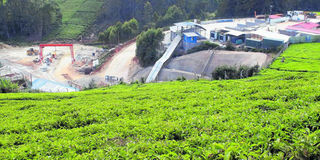Northern Collector Tunnel 'complete', save for Sh3.5 billion debt

The site of the Northern Collector Tunnel project in Makomboki, Murang'a County, as pictured on February 7, 2017. Experts say the project will collect run-off water, which feeds into the Athi and Tana rivers, affecting downstream communities.
What you need to know:
- The project, which commenced in 2015 and was to be completed by April, has hit a snag over an outstanding bill of Sh3.5 billion.
The Northern Collector Tunnel will be operational in six months, the Athi Water Works Development Agency has said.
The project, which commenced in 2015 and was to be completed by April, has hit a snag over an outstanding bill of Sh3.5 billion.
The project entails construction of an 11.8km underground tunnel that draws flood water from Maragua, Gikigie and Irati rivers.
The agency’s chief executive officer (CEO) Michael Thuita said the matter was escalated to the Cabinet on Tuesday and that they are waiting for a response from the National Treasury.
Mr Thuita noted that the tunnel is expected to pump in an additional 140,000 cubic metres of water per day to 1.2 million Nairobi residents and those in its environs.
The project is essentially complete, he said, adding they are only awaiting money owed to contractors, for project clearance before a handover.
“The tunnel is complete. We are only awaiting the final touches. The moment we clear the bill we will finish the remaining work within two weeks,” said Mr Thuita.
“Once we clear the Sh3.5 billion bill, we will start using the tunnel within a month and then be able to deliver water to Nairobi within six months,” he added.
Project costs
The project has three main components: the tunnel that cost about Sh8.5 billion; the water treatment plant that was constructed at Sh4.5 billion; and the pipelines that cost about Sh7.5 billion.
There is also a land compensation cost of Sh8 billion, raising the total to about Sh30 billion.
For the tunnel itself, Sh1.7 billion is owed. Another Sh724 million is owed for the water treatment plant while Sh1 billion is for the pipeline component.
The piping will run from Thika Dam to Gigiri reservoirs in Nairobi before the water is distributed across the capital city and its environs.
“Piping has been done. The water treatment plant was completed about two years ago but the contractor says he will not hand it over until the Sh724 million is paid,” the CEO said.
“We also have to clear the balance for the tunnel for the contractor to pay suppliers for the remaining bit of work.”
Nairobi’s big issue
Nairobi has been experiencing water rationing since April 2017 with most parts of the county getting water only once a week.
The demand for water has outstripped supply by close to 350,000 cubic metres daily.
This is because the installed water treatment system in the city can only process 526,000 cubic meters of water daily, against a demand of close to 900,000 cubic meters, with the demand estimated to increase by 20,000 cubic meters every year.
Ndakaini Dam and Ngethu treatment plant supply 480 million litres of water to Nairobi daily while Sasumua supples 59 million litres.
Ruiru 1 Dam and Kikuyu Springs contribute 26.8 million litres of water every day.
The dire situation has seen proliferation of vendors who make a killing from city residents by charging as high as Sh50 for a 20-litre jerrycan of water.





